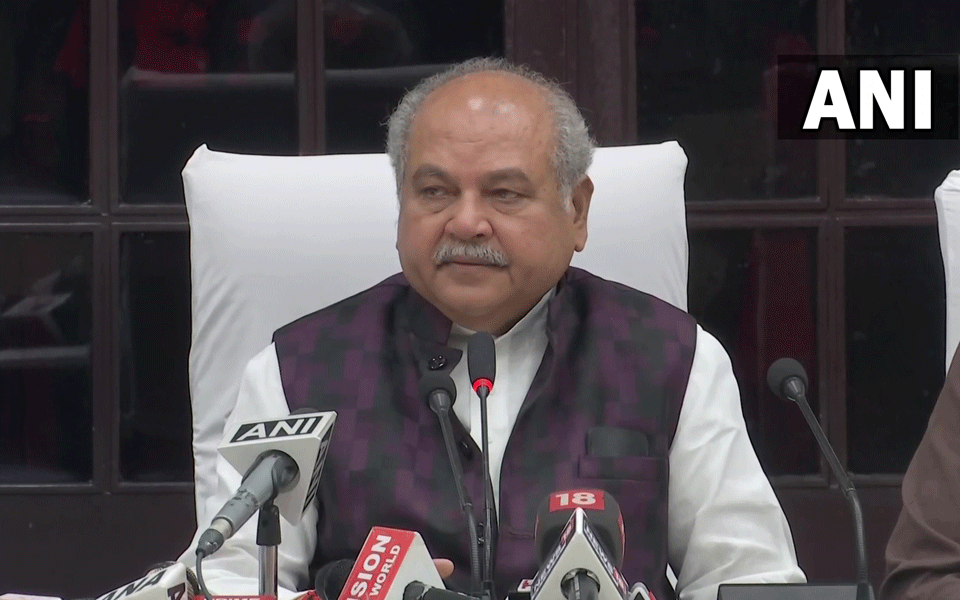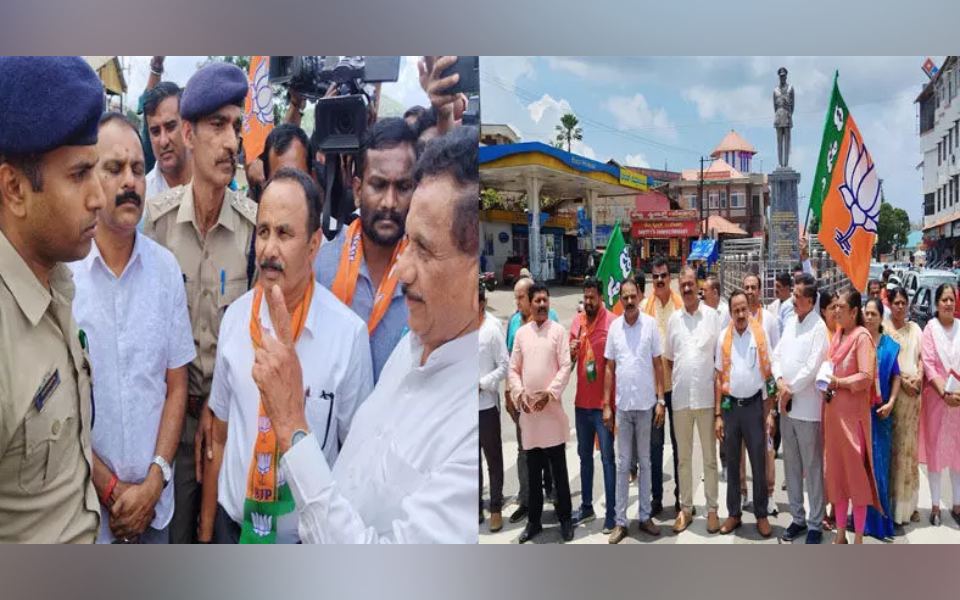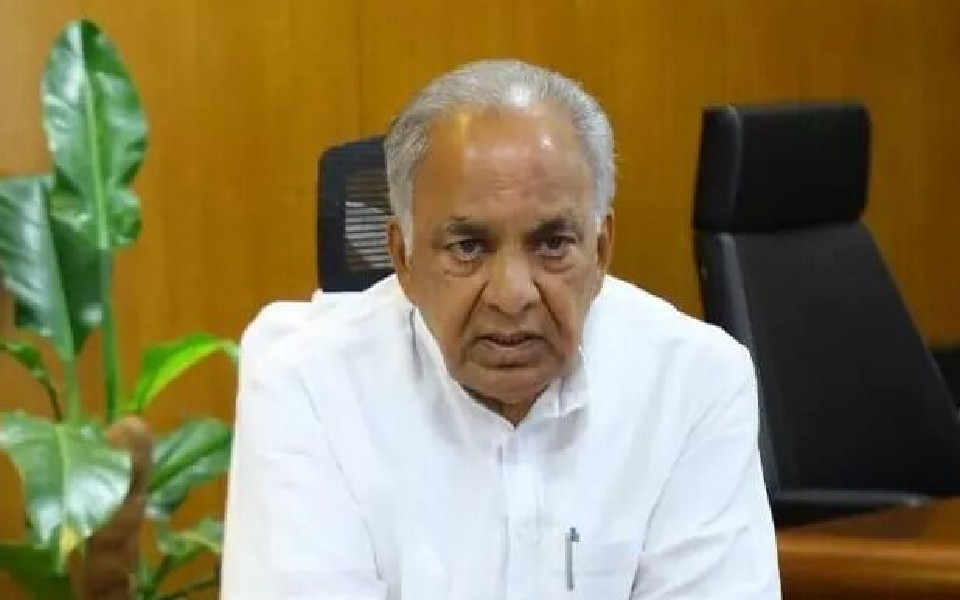New Delhi (PTI): As air pollution rises, agriculture minister Narendra Singh Tomar on Friday said stubble burning is not a "political issue", while expressing concern over rising such incidents in neighbouring states of Delhi despite funding and machines provided by the Centre.
Tomar appealed to four state governments -- Punjab, Uttar Pradesh, Haryana and Delhi -- to take steps to control it, making use of available solutions i.e. Pusa decomposer, a bio-decomposer technique that converts stubble into compost much faster than usual.
Pusa decomposer, developed by the Indian Council of Agricultural Research (ICAR), is cheaper and easier to use. It not only controls stubble burning but also improves the soil fertility and productivity of soil, he added.
Tomar also said he held a review meeting a week back with concerned state government officials on the stubble burning situation. He would welcome if respective chief ministers wish to have further discussion on this matter.
Stubble burning in neighbouring states, which has been an old menace during the paddy harvesting season, remains a significant contributor to air pollution, especially across northern India, including the national capital. A maximum of 55 per cent stubble burning takes place in Punjab.
Addressing a day-long event on 'Pusa decomposer', Tomar said there is more discussion on "politics" surrounding stubble burning than its impact on land and what steps farmers should take to curb it.
Since the time stubble burning has become a major issue, the Centre, states, and judiciary have taken note of it and schemes have been implemented, he said.
For management of stubble, the Centre has provided Rs 3,138 crore to four states since 2018-19 and two lakh machines have been made available to them. Out of which, more than Rs 1,400 crore has been given to Punjab, Rs 900 crore to Haryana, Rs 713 crore to Uttar Pradesh and Rs 6-7 crore to Delhi, he said.
"Despite providing crores of rupees and 2 lakh machines, the stubble burning incidents are rising and it is definitely a cause of concern," Tomar said.
If those machines (like Happy seeder, a tractor mounted machine that cuts and lifts rice straw and sows wheat into the soil, and deposits the straw over the sown area as mulch) are put to use fully, there won't be a problem. If states want to control it then the answer lies in using whatever solutions available at present, he said.
Asserting that Pusa decomposer is a successful technique for decomposing the stubble, the minister said, "It is cheaper and easier to use. Farmers have used it. Decomposer will not only control stubble burning but improve soil fertility."
Some states, especially Uttar Pradesh and Haryana, have done good work and are moving towards a positive direction.
At that time, it was said that had decomposer machines been deployed, stubble burning would have been effectively controlled. Thereafter, about two lakh machines were made available to the states, he said.
"About 2 lakh machines have been purchased through states... if a state is determined, it can control stubble burning," Tomar told reporters on the sidelines of an event.
As agriculture minister, Tomar further said, he feels bad when farmers are blamed for the rise in pollution in Delhi.
"I am agriculture minister and represent the farming community. If pollution in Delhi rises due to farmers, I feel they are blaming me. It is everyone's responsibility to get rid of this stigma on farmers," he said.
He also said the stubble burning is not a "political issue," it is affecting both soil and air. But there is more debate on "politics" than its impact on the environment.
"In the evening those not concerned with the topic debate on the issue without any logic. Usually, the discussion is not on what farmers should do to address this problem," he said.
He further said the question is not what is the reason behind stubble burning. The point is paddy sowing is the country's necessity.
"Paddy is grown and machines are used (for harvesting), which results in huge quantities of stubble. The discussion is necessary on how to manage this stubble and what steps farmers, scientists and the governments should take," he added.
Agriculture secretary Manoj Ahuja said, "Stubble burning has posed a big challenge before us and we have to address this at the earliest. About 55 per cent stubble burning happens in Punjab, while rest in Delhi, Haryana and very less in Uttar Pradesh and Rajasthan."
In Punjab, farmers burn the paddy stubble as they have less time for planting wheat. Several steps have been taken to promote short duration paddy varieties that can be harvested in 135-145 days instead of 165 days of present paddy variety, he said.
About two lakh machines like 'Happy seeder' and 'Smart seeder' have been made available to the farmers and even Pusa decomposer is successful in converting the stubble into compost, he said, and urged farmers and states to use the available solutions to address the problem of stubble burning.
Several farmers from neighbouring states attended the day-long event that discussed ways to address concerns of farmers, if any.
Let the Truth be known. If you read VB and like VB, please be a VB Supporter and Help us deliver the Truth to one and all.
Guwahati, Apr 4 (PTI): The Assam cabinet has decided to lift all cases pending against people from the Koch Rajbongshi community in the Foreigners' Tribunals, Chief Minister Himanta Biswa Sarma said on Friday.
They will also no longer carry the tag of 'D' or doubtful voters, he said.
''There are 28,000 cases pending in different Foreigners' Tribunals in the state against people of the community. The cabinet has taken a historic decision of lifting the cases with immediate effect,'' Sarma said at a press conference here after the cabinet meeting.
The government believes that the Koch Rajbongshis are an indigenous community of the state and they are an inextricable part of ''our social and cultural fabric'', he asserted.
The people of this community are poor and have suffered a lot over the years, he said.
''They will no longer carry the tag of foreigners or ‘D’ voters,'' the CM said.
Foreigners Tribunals are quasi-judicial bodies, particularly in Assam, established to determine if a person residing in India is a "foreigner" as defined by the Foreigners Act of 1946, based on the Foreigners (Tribunals) Order of 1964.
These tribunals are designed to address matters related to citizenship and the presence of “foreigners” in India, specifically focusing on cases where someone is suspected of being an illegal immigrant.
There are 100 Foreigners’ Tribunals across Assam.
The Koch Rajbongshis have a sizeable presence in Assam, West Bengal, Meghalaya, and parts of Bangladesh, Nepal, and Bhutan, and they demand Scheduled Tribe status.





